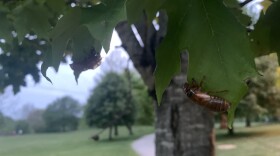Experts say the number of Brood X cicadas emerging this year is on par with their last appearance 17 years ago. Roger Hangarter, a distinguished professor of biology at Indiana University, said colder spring weather delayed their emergence by almost one week, but the cold is hardly a factor once they are above ground.
He said coverage may seem more sporadic this year because of recent construction.
“Areas where there’s new developments, usually they’re down because all the trees were damaged or removed," Hangarter said. "Or all the trees are too young that were planted too far from 2004.”
He said the total population of cicadas is currently peaking with the latest emergence at the end of last week. He anticipates a handful of late arrivals but says the majority of the population will taper off by the end of June.
"The adults apparently live about two weeks in the adult form until they finish matting and they die," Hangarter said. "So we really shouldn't go much beyond two weeks from now."




